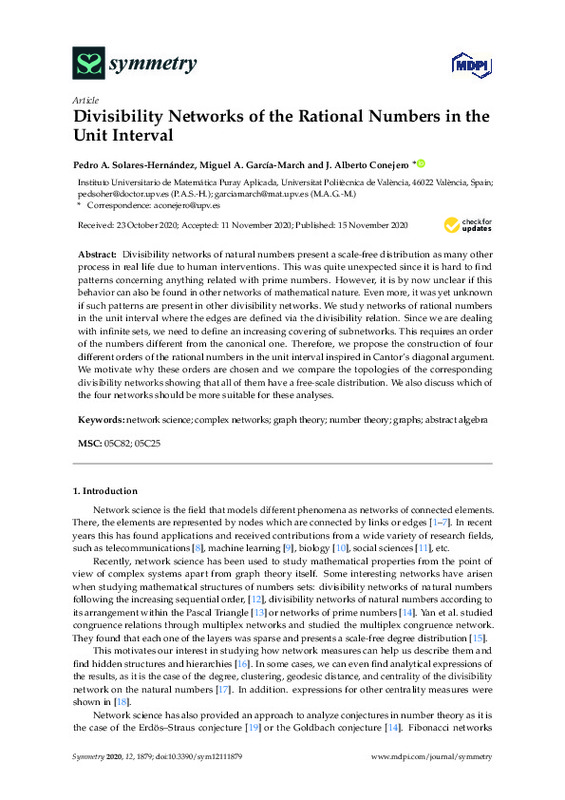JavaScript is disabled for your browser. Some features of this site may not work without it.
Buscar en RiuNet
Listar
Mi cuenta
Estadísticas
Ayuda RiuNet
Admin. UPV
Divisibility networks of the rational numbers in the unit interval
Mostrar el registro sencillo del ítem
Ficheros en el ítem
| dc.contributor.author | Solares-Hernández, Pedro A.
|
es_ES |
| dc.contributor.author | Garcia March, Miguel Angel
|
es_ES |
| dc.contributor.author | Conejero, J. Alberto
|
es_ES |
| dc.date.accessioned | 2021-11-05T14:09:50Z | |
| dc.date.available | 2021-11-05T14:09:50Z | |
| dc.date.issued | 2020-11 | es_ES |
| dc.identifier.uri | http://hdl.handle.net/10251/176390 | |
| dc.description.abstract | [EN] Divisibility networks of natural numbers present a scale-free distribution as many other process in real life due to human interventions. This was quite unexpected since it is hard to find patterns concerning anything related with prime numbers. However, it is by now unclear if this behavior can also be found in other networks of mathematical nature. Even more, it was yet unknown if such patterns are present in other divisibility networks. We study networks of rational numbers in the unit interval where the edges are defined via the divisibility relation. Since we are dealing with infinite sets, we need to define an increasing covering of subnetworks. This requires an order of the numbers different from the canonical one. Therefore, we propose the construction of four different orders of the rational numbers in the unit interval inspired in Cantor's diagonal argument. We motivate why these orders are chosen and we compare the topologies of the corresponding divisibility networks showing that all of them have a free-scale distribution. We also discuss which of the four networks should be more suitable for these analyses | es_ES |
| dc.description.sponsorship | JAC was funded by MEC grant number MTM2016-75963-P. PASH acknowledges the support of MESCyT-RD, Casa Brugal, and Fundacion Proyecto Escuela Hoy Inc. for his PhD grants. MAGM acknowledges funding from the Spanish Ministry of Education and Vocational Training (MEFP) through the Beatriz Galindo program 2018 (BEAGAL18/00203) and Spanish Ministry MINECO FIDEUA PID2019-106901GB-I00/10.13039/501100011033. | es_ES |
| dc.language | Inglés | es_ES |
| dc.publisher | MDPI AG | es_ES |
| dc.relation.ispartof | Symmetry (Basel) | es_ES |
| dc.rights | Reconocimiento (by) | es_ES |
| dc.subject | Network science | es_ES |
| dc.subject | Complex networks | es_ES |
| dc.subject | Graph theory | es_ES |
| dc.subject | Number theory | es_ES |
| dc.subject | Graphs | es_ES |
| dc.subject | Abstract algebra | es_ES |
| dc.subject.classification | MATEMATICA APLICADA | es_ES |
| dc.title | Divisibility networks of the rational numbers in the unit interval | es_ES |
| dc.type | Artículo | es_ES |
| dc.identifier.doi | 10.3390/sym12111879 | es_ES |
| dc.relation.projectID | info:eu-repo/grantAgreement/AEI/Plan Estatal de Investigación Científica y Técnica y de Innovación 2017-2020/PID2019-106901GB-I00/ES/PHYSICS OF NEW CHALLENGES/ | es_ES |
| dc.relation.projectID | info:eu-repo/grantAgreement/AEI/Plan Estatal de Investigación Científica y Técnica y de Innovación 2013-2016/MTM2016-75963-P/ES/DINAMICA DE OPERADORES/ | es_ES |
| dc.rights.accessRights | Abierto | es_ES |
| dc.contributor.affiliation | Universitat Politècnica de València. Departamento de Matemática Aplicada - Departament de Matemàtica Aplicada | es_ES |
| dc.description.bibliographicCitation | Solares-Hernández, PA.; Garcia March, MA.; Conejero, JA. (2020). Divisibility networks of the rational numbers in the unit interval. Symmetry (Basel). 12(11):1-12. https://doi.org/10.3390/sym12111879 | es_ES |
| dc.description.accrualMethod | S | es_ES |
| dc.relation.publisherversion | https://doi.org/10.3390/sym12111879 | es_ES |
| dc.description.upvformatpinicio | 1 | es_ES |
| dc.description.upvformatpfin | 12 | es_ES |
| dc.type.version | info:eu-repo/semantics/publishedVersion | es_ES |
| dc.description.volume | 12 | es_ES |
| dc.description.issue | 11 | es_ES |
| dc.identifier.eissn | 2073-8994 | es_ES |
| dc.relation.pasarela | S\421761 | es_ES |
| dc.contributor.funder | Agencia Estatal de Investigación | es_ES |
| dc.contributor.funder | MINISTERIO DE CIENCIA INNOVACION Y UNIVERSIDADES | es_ES |
| dc.subject.ods | 04.- Garantizar una educación de calidad inclusiva y equitativa, y promover las oportunidades de aprendizaje permanente para todos | es_ES |








